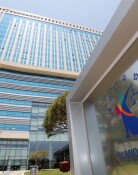U.S. to Assure Korea of Sovereignty Over Beef Import
U.S. to Assure Korea of Sovereignty Over Beef Import
Posted May. 20, 2008 03:55,
The government decided to have additional talks with Washington on Seouls sovereign right to halt American beef imports if a new case of mad cow disease, or bovine spongiform encephalopathy (BSE), is reported in the United States.
Korean officials have also been consulting with their U.S. counterparts over ways to prohibit some of the specified risk materials (SRMs) from cattle over 30 months old from entering the country. The discussed SRMs include transverse processes and spinous processes of the cervical, thoracic and lumbar vertebrae.
The outcomes of the additional negotiations will likely be the deciding factor in calming the controversy over American beef imports, as well as the ratification of Koreas free trade agreement with the United States.
○ Fine tuning on Seouls quarantine sovereignty over U.S. beef
The government is set to announce the results of its additional negotiations with the United States, concerning sanitary terms on U.S. beef imports, including ways to guarantee Seouls quarantine sovereignty in written form, according to the Free Trade Agreement Bureau of the Ministry of Foreign Affairs and Trade on Monday.
We are discussing with U.S. officials over the ways to specify Korea`s right to take measures necessary to protect the lives and health of its people, animals and plants, in written form as stipulated in Article 20, Paragraph B of the General Agreement on Tariffs and Trade (GATT), said a Foreign Ministry official.
According to sources, Korean officials have obtained a new concession from their U.S. counterparts regarding a written guarantee over Seouls sovereign right to conduct inspections of American beef facilities should a case of BSE is confirmed in the United States. The two sides are reportedly discussing the details of the new concession. The ministry had originally planned to announce the outcomes of the additional negotiations yesterday, but postponed the announcement by one day because the two sides were still ironing out some minor differences.
During the recent talks, the two sides reportedly focused on guaranteeing Seouls quarantine sovereignty in a separate diplomatic document signed by the two governments, rather than revising the relevant regulations agreed on April 18 or adding a regulation regarding Seouls quarantine sovereignty to the agreement.
Seoul will likely add a supplementary provision banning U.S. beef in case of the discovery of BSE to the governments promulgation of the sanitary terms on U.S. beef imports and, Washington will then recognize it as a diplomatic document.
The sanitary terms on U.S. beef imports agreed on April 18 triggered public fury as they stipulate that the government cannot stop the United States from shipping its beef to Korea even if a case of BSE is reported in that country, unless the World Organization for Animal Health (OIE) lowers the current U.S. status of a controlled-BSE risk country.
Although the government explained that it would ban U.S. beef imports if it is necessary to protect public health based on Article 20 of the GATT, public discontent has not calmed down.
○ Will regulations on SRMs be changed?
Korea is also seeking ways to ban the import of SRMs that are allowed in accordance to the April 18 agreement through the additional negotiation. However, the government has not brought up the issue of banning the import of American beef from cattle older than 30 months in this round.
The Article 1, Paragraph 9 of the U.S. beef import agreement says that transverse processes and spinous processes of the cervical, thoracic and lumbar vertebrae, median crest and wings of the sacrum from cattle 30 months of age and over at the time of slaughter are excluded from the SRM list. This regulation triggered massive public protests and opposition as these parts are specified as SRMs and banned for human consumption by the U.S. Food and Drug Administration.
Regarding this, a senior official of the Ministry of Food, Agriculture, Forestry and Fisheries said, The United States is planning to export its beef after removing all these parts in accordance to its own standards. In order to dispel unnecessary misunderstanding on the parts that will not be shipped to Korea, we are also discussing revising (the agreement) on this area.
The official, however, said, This doesnt mean a complete or partial revision as it will simply add new conditions on the beef agreement. Thus, I believe that there is no need to renegotiate on the sanitary terms of U.S. beef imports.
○ Will this help the KORUS FTA be ratified?
Rep. Kim Won-woong of the United Democratic Party, who chairs the National Assembly`s Unification, Foreign Affairs and Trade Committee, also mentioned Sunday night that he received a report from the government that there had been a progress in the talk between Seoul and Washington over stating Koreas quarantine sovereignty in the case BSE is reported in the United States in written form. If we confirm that this progress has been made, we can follow the procedures necessary for the ratification of the FTA, such as opening a National Assembly panel to review the bill, said Kim.
Committee members such as UDP lawmaker Lee Hwa-young and Grand National Party lawmaker Jin Young were also at the scene along with government officials, such as Foreign Minister Yu Myung-hwan, Agriculture Minister Chung Woon-chun and Trade Minister Kim Jong-hoon.
Meanwhile, UDP floor spokesman Choi Jae-sung said on Monday, Both Chairman Kim and committee member Lee did not report any thing about the matter to the party leadership before or after they received the government report.







